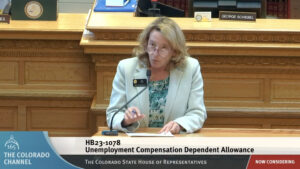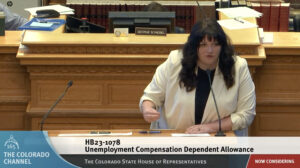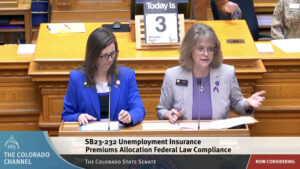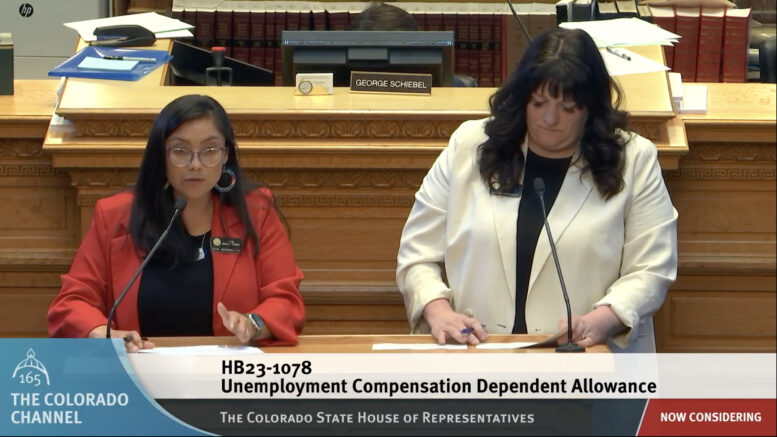Once again, Colorado’s Unemployment Insurance Trust Fund is the subject of major debate.
After a month of discussions around the potential use of unemployment-tax revenue for funding enforcement of labor laws, Colorado legislators sent a bill to Gov. Jared Polis this week that limits such funding now but not necessarily in years to come.
That effort, meanwhile, comes as the Colorado Chamber of Commerce and other business groups that pushed for the change fight a separate but related battle on a proposed expansion of unemployment-insurance benefits that would pay a stipend to recipients’ children. That proposal, House Bill 1078, received preliminary approval in the House on Wednesday.
What links the two debates is an overriding concern that the UITF, which went broke in August 2020 under a crush of pandemic-related benefit applications, is nowhere near solvency and shouldn’t have its limited reserves used for purposes beyond existing benefits. Until the fund reaches actuarial solvency of more than $1 billion — a milestone not expected to be hit until between 2026 and 2030 as the state continues to repay federal loans — employers must pay a solvency surcharge beginning next year that will add to their debt to the UITF.
An unemployment fund “in trouble”
“Unfortunately, we have heard over and over and over again that everything’s OK. But the reality is very different. The Unemployment Insurance Trust Fund is in trouble,” said Rep. Lisa Frizell, R-Castle Rock, during debate Wednesday in the House over HB 1078. “It is not funded by unicorns or pixies or fairies. It is funded by Colorado employers who pay in unemployment-insurance premiums … This fund became insolvent and is still to this day insolvent.”

Colorado state Rep. Lisa Frizell speaks Wednesday against a bill to offer payments to children of unemployment beneficiaries.
The UITF provides limited-time money to workers who lose their jobs through no fault of their own — funding that is usually equivalent to about 40% of their salaries. It does not receive general-fund tax revenue, relying wholly on taxes paid into it by employers based upon their workforce size and layoff experience.
The fund also provides a small payment through a sub-account known as the Employment Support Fund that helps the Colorado Department of Labor and Employment administer the UITF and allows CDLE to offer job-training grants to local workforce-development organizations.
With CDLE remaining $1 billion in debt last spring to the U.S. Treasury for loans that helped the UITF function after it went broke, the Legislature approved a transfer of $600 million into the UITF, allowing the state to pay off those loans and avoid rescission of a federal tax break. CDLE needed more loans to continue benefit payments early this year — it now has a $73.2 million federal debt and $33 million private debt — but expects to repay them after getting first-quarter payments from employers that make up the bulk of new money coming into the fund each year.
Costs to employers and workers
In order to replenish the fund, employers are paying unemployment taxes at the highest level allowed under state law. And because of a 2020 law change, they are paying them on an increasingly higher base wage that is meant to make up for roughly a decade in which the base wage for those taxes did not increase.
And it’s against that background that legislators are waging battles over bills attempting to use more of the money coming in from unemployment-tax payments.
HB 1078, sponsored by Democratic Reps. Jenny Willford of Northglenn and Serena Gonzales-Gutierrez of Denver, seeks to create a $35-per-week stipend from the UITF for minor children and disabled adult children of Coloradans receiving unemployment benefits.

Colorado state Rep. Jenny Willford speaks Wednesday on her bill to give benefits to the children of some unemployed Coloradans.
The extra funding is necessary, Willford said during debate in the House on Wednesday, because unemployment payments often aren’t enough to cover fixed expenses like childcare or kids’ food. That’s particularly true for single mothers who are trying to balance finding a new job with supporting their families, and every 0.2% drop in the percentage of women participating in the workforce equates to a $4.4 billion decrease in economic impact, she said.
Business opposition
“Not only is this an equity issue, it’s a women-in-the-workforce issue. When a single mother loses her job and she can’t pay for childcare, it’s highly unlikely that she will return to the workforce,” Willford said. “The bill isn’t earth-shattering, it’s not massive. It’s not doing what we need to do, which is overhaul unemployment insurance.”
But business groups argue that it is taking money away from the UITF before the fund has a chance to get built back up again and relieve financial burdens on employers already dealing with significant inflation in labor costs, rent and the prices of goods. While Willford said the UITF is expected to have a $1.7 billion reserve when payments begin in July 2026, more conservative estimates from CDLE say any hiccup in economic recovery could require the solvency surcharge to remain in place for several years beyond then.
A study conducted last year by CDLE estimated that the addition of dependent benefits could cost anywhere between $15.4 million and $56 million per year. And, with the bill expected to pass the House officially this week and then head to the Colorado Senate, the debate is likely to continue around the benefits HB 1078 could bring versus the damage it could do to an unemployment fund still struggling to get to solvency.
The ESF controversy
HB 1078 also would take $655,530 from the Employment Support Fund next year for CDLE to begin adjusting its computer system and hiring workers to administer the new dependents’ benefits program. But while the bill was one of six proposals that originally sought to use ESF revenues this year, it’s the only one still seeking this source of funding.
That’s due largely to CDLE Executive Director Joe Barela expressing his “extreme opposition” to legislators over plans to use the fund to pay for enforcement of several proposed labor laws, including the expanded Equal Pay for Equal Work act and the failed Fair Workweek bill. Saying that the money is needed both to retrain workers during a time of labor shortage and to refill the UITF, Barela threatened in a letter to ask Gov. Jared Polis to veto any bills other than HB 1078 that sought to use ESF revenues.

Colorado state Sen. Rachel Zenzinger and Barbara Kirkmeyer speak in the Senate on April 3 on SB 232.
Senate Bill 232, sponsored by Democratic Sen. Rachel Zenzinger of Arvada and Republican Sen. Barb Kirkmeyer of Brighton, would make changes to the ESF to bring it into compliance with federal law and cap the fund at $32.5 million, sending any access money back to the UITF. Funded under a 1990 law by the first .00145% of employers’ unemployment-insurance taxes, the ESF is expected otherwise to grow significantly as the base wage rate for payments expands.
A reversal on SB 232
Changes the sponsors made in the Senate to SB 232 also eliminated plans to enforce three 2022-passed labor laws with ESF money and repealed a 2001 law that allowed the fund to go toward labor standards, labor relations and the Colorado works grievance procedure. However, the House removed the repeal of that 2001 law from the bill when Rep. Emily Sirota, a co-sponsor of SB 232 and member of the Joint Budget Committee, objected to such a wholesale change to a proposal that didn’t originally contemplate such restrictions.
The majority of Senate Republicans objected Tuesday to undoing the amendment that permanently would bar ESF money from funding enforcement of labor laws, with Sen. Bob Gardner, R-Colorado Springs, saying that had been “closely negotiated with stakeholders and CDLE.” But they were overruled by majority Democrats in the chamber, and the bill now is onto Polis with a cap on the ESF and no current funding for labor-law enforcement but no provision permanently barring such a practice.
